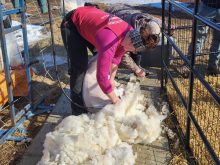Lawyers have taken over the fight to reopen the United States border to Canadian cattle and beef.
The activity stems from the preliminary injunction granted by U.S. judge Richard Cebull March 2 to keep the border closed. Based in the Billings, Montana, division of the Ninth Circuit, he also instructed R-CALF and the U.S. Department of Agriculture to schedule a trial on the merits of a permanent injunction. That is to be heard July 27 in Billings.
The basis of the case is whether the USDA rule to allow imports of beef and live cattle from regions at minimal risk for BSE, including Canada, poses a safety risk to U.S. citizens or economic harm to U.S. cattle producers.
Read Also

Charges laid after cattle theft
Saskatchewan RCMP lay two charges against a man after six cattle went missing.
R-CALF argued the government failed to quantify the risk of BSE to the public and beef producers. It did not specify risk to human health.
However, Cebull wrote in his decision of a potential risk to the American people from consuming beef from Canada or from Canadian cattle slaughtered in the U.S. because it brings an elevated risk of variant Creutzfeld Jakob disease. Cebull was also critical of the USDA for not quantifying the risk further.
Meanwhile, the National Meat Association and the American justice department on behalf of the USDA appealed to the Ninth Circuit court of appeals in San Francisco to overturn the March 2 decision.
“What is happening is the one lawsuit is splintering into three,” said Jeremy Russell of the National Meat Association.
Emergency appeal
The NMA, representing smaller U.S. processors and packers, wants the injunction dissolved. Its original appeal was denied so an emergency motion to accept the appeal was filed and accepted.
“They said when we filed our emergency motion they would hold the hearing at the earliest possible convenience, but they haven’t let us know when that is,” Russell said.
The Ninth Circuit said the same panel of three judges that hears the USDA appeal sometime after May 26 would hear the meat association appeal at the same time.
“The department of justice is deciding what pace things go in tandem with USDA. Of course, they are very interested in maintaining control of the law,” Russell said.
Numerous livestock and food processing associations have filed friend of the court briefs in support of the USDA appeal. Included are the Canadian Cattlemen’s Association, National Cattlemen’s Beef Association, National Restaurant Association, United Food and Commercial Workers, Tyson’s Foods, American Meat Institute, American Farm Bureau Federation and others applying to provide additional information on the issue.
No court date has been set for a hearing.
“We told our lawyers time is of the essence,” said Janet Riley of the American Meat Institute.
The institute and the other friends of the court argued the District Court abused its discretion by mandating continued closure of the border to Canadian cattle and beef products. The meat association noted in its brief that U.S. and international law require open borders unless closure is necessary to prevent introduction of a livestock disease, and the scientific evidence is clear that continued closure of the border is unnecessary. It argued the lower court’s injunction would perpetuate significant injury on the American beef industry and beef consumers.
A consumer study from the meat institute showed the retail price of ground beef had increased more than 20 percent since the closure to Canadian animals. Some restaurants reported a 35 percent price increase in ground beef. As the price of beef increased, consumers switched to poultry, pork and eggs. In response, pork prices increased by 5.4 percent and poultry went up 7.5 percent, the highest increase since 1989.

















